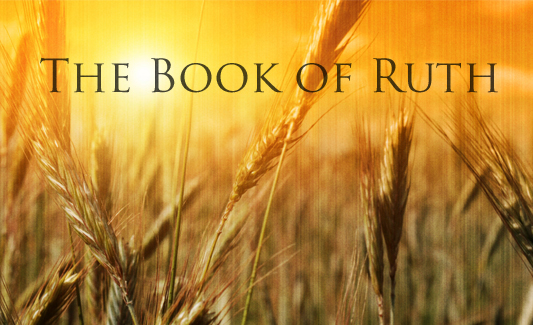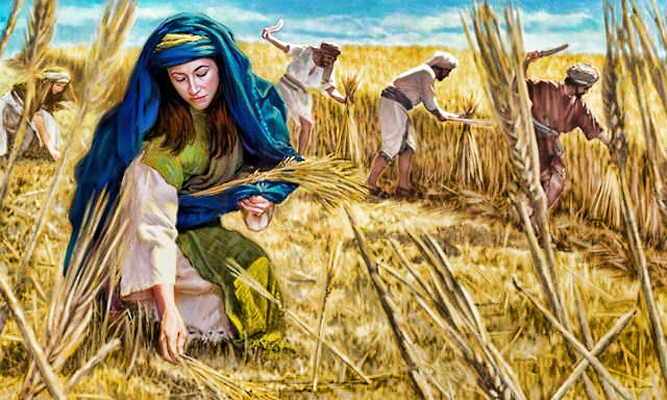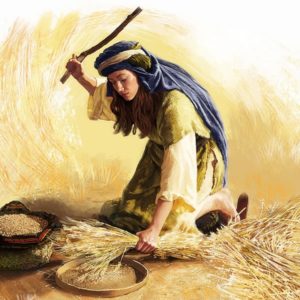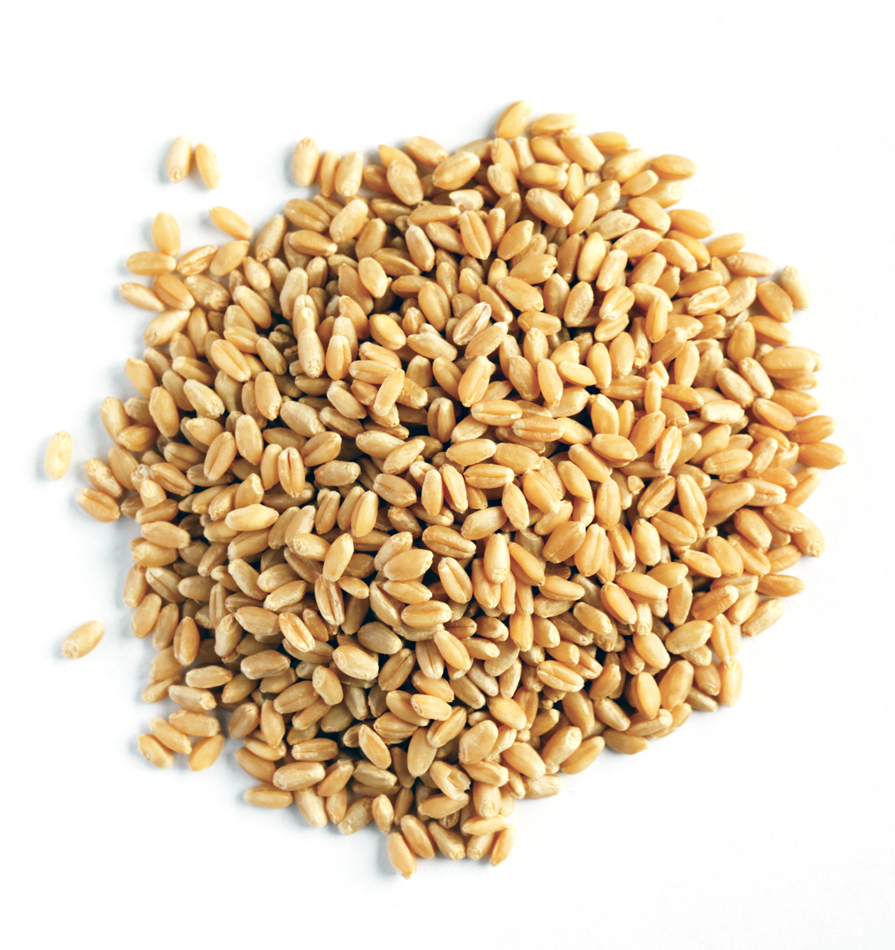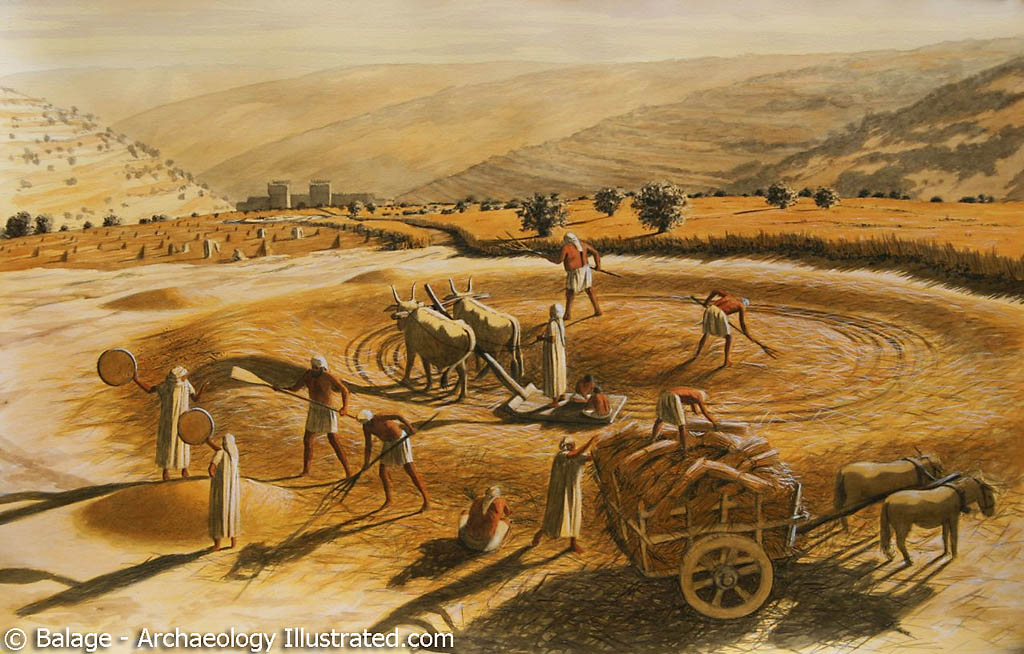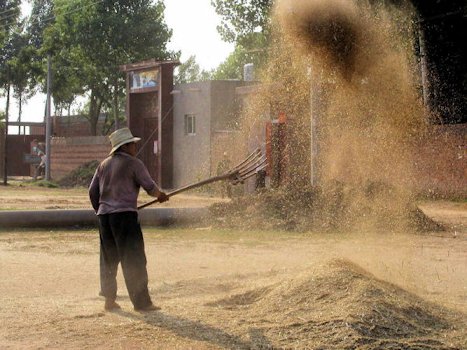Ruth
The Book of Ruth is set “in the days when the judges ruled”, a period of social and religious disorder when every man did that which was right in his won eyes” (Judges 17:6). This era bridged the time between the conquest of the land under Joshua (Ephraim) and the rise of King David (Judah).
There was a famine[h7458] in Bethlehem[h1035]
Strong’s Hebrew ConcordanceFamine [h6327] occurs 101 times in 88 verses 17 books
- famine, hunger, scarcity of grain
Strong’s Hebrew ConcordanceBethlehem [h1035] occurs 41 times in 39 verses
- “house of bread”
- 4 miles directly south of Jerusalem
- a city allotted to Judah
- Rachel was buried here after giving birth to Benjamin
- David was born here and was crowned King of Israel
- Jesus was born in Bethlehem
Strong’s Hebrew ConcordanceEphrath or Ephratah [h672] occurs 10 times in 9 verses
- Ephrath or Ephratah = “ash-heap: place of fruitfulness”
- another name for Bethlehem
- Caleb married Ephrath and bare unto him Hur (viper, of a hole),
- Hur was the firstborn of Ephratah,
- Hur was the father of Bethlehem.
- Hur was a chief assistant to Moses and Aaron, who along with Aaron, held up Moses hands at the top of the hill while they battled the Amalekites (Esau’s grandchildren)
- Hur was the grandfather of Bezaleel, who was the chief architect of the tabernacle
- Caleb (Judah) and Joshua (Ephraim) were the only 2 that made it to the promised land.
Naomi and Elimelech had 2 sons Mahlon and Chilion,
who were Ephrathites of Bethlehem-Judah.
*Jesse, the father of David, was referred to in 1 Samuel 17
as an Ephrathite of Bethlehemjudah as well
Strong’s Hebrew ConcordanceEphrathite [h6327] occurs 5 times in 5 verses
- Ephrathite = “ashiness: fruitfulness”
an inhabitant or descendant of Ephraim
an inhabitant of Bethlehem
- Because of the famine they journeyed to the land of Moab where the 2 sons married Moabite women.
- Mahlon married Ruth and Chilion married Orpah.
- Naomi’s husband Elimelech then died along with their 2 sons Mahlon and Chilion.
- After 10 years, Naomi was left with just 2 daughter in laws.
- Naomi planned on going back alone to Bethlehem, but Ruth decided to stay with her, while Orpah stayed in Moab.
Naomi thought that the Lord’s hand of judgement was upon her after she and her husband left the promised land in search of food and married their sons to Moabite women in search of offspring she underestimated God’s grace because Ruth, turned out to be the means by which the Lord would meet her needs for food and offspring to carry on the family name.
Naomi went out full and came back empty, which parallels the parable of the Prodigal Son, which is about Ephraim, who wasted his substance and riotous living but when he returned, his father celebrated his return and killed the fatted calf. Naomi and her family, who were Ephraimite’s, had wandered away from the land where the Lord had promised to bless them in search of fullness, but as a result came back empty and alone, yet the Lord’s judgement on her was designed to bring her back home and replace the emptiness with new fullness.
Just as the prodigal son returned home and his father killed the fatted calf for him, Naomi returned back to Bethlehem where the Lord provided bread and provided conception for Ruth which would provide His people with a King to meet their need for leadership.
These are lessons that speak to us as well because we too as Lost Sheep have gone astray from the Lord and need to receive His grace and mercy.
The book of Ruth demonstrates how the Lord shows His covenant faithfulness to His undeserving people, often in surprising ways In the course of the narrative, each of the main characters proved to be a person of extraordinary courage and covenant love. There are people whose spiritual commitment is demonstrated clearly in godly living.
- Naomi returned to Bethlehem with Ruth at the beginning of the Barley [h8184] Harvest [h7105]
Strong’s Hebrew ConcordanceBarley [h8184] occurs 34 times in 32 verses 17 books
- (feminine, meaning the plant);
- (masculine, meaning the grain);
- so called from “hairy ears”
- from H8175 in the sense of roughness
Strong’s Hebrew ConcordanceHarvest [h7105] occurs 54 times in 49 verses 17 books
harvest, harvesting
process of harvesting
crop, what is harvested or reaped
time of harvest
boughs, branches
- from H7114; severed, i.e. harvest (as reaped), the crop, the time, the reaper,
- or figuratively; also a limb (of a tree, or simply foliage):—bough, branch, harvest (man).
- Upon there return to Bethlehem, Ruth asked Naomi to let her go and Glean [h3950]Ears of Corn [h7641] after the reapers, and did so in hope of gathering in the portion of the field that belonged to Boaz, who was a kinsman (“relative”) of Elimelech’s, and who was a might man of wealth.
Strong’s Hebrew ConcordanceGlean [h3950] occurs 37 times in 34 verses
to pick up, gather, glean, gather up
(Qal)
to pick up, gather
to glean
Strong’s Hebrew ConcordanceEars of Corn [h7641] occurs 19 times in 16 verses
a stream (as flowing);
also an ear of grain (as growing out);
by analogy, a branch:—branch, channel, ear (of corn), (water-)flood,
Ruth’s choice of a place to glean, which seemed to be a matter of chance, turned out to be a divine appointment with Boaz, the man who would fulfill the role of family redeemer for Naomi and Ruth.
- Boaz asked his servant that was set over the reapers, “Whose Damsel is this?”, and they told her it was Ruth who came back with Naomi
- Ruth asked Boaz to let her glean and gather after the reapers among the sheaves so Boaz let her.
- Boaz then told Ruth to not glean in another field and for her to abide with his maidens
- Boaz told her she could drink from the water drawn by his servants when she got thirsty
Boaz issued instructions to ensure her safety and allowed her to drink the water his young men had brought to saver her the lengthy trip to the well.
- Ruth asked Boaz why she had found favor in his eyes
- He said that he had seen all that she had done with his mother in law Naomi and how she forsook her father and mother, and land of nativity.
- He said the Lord recompense thy work and a full reward be given thee of the Lord God of Israel under whose Wings [h3671](skirt) thou came to trust.
Strong’s Hebrew ConcordanceWings [h3671] occurs 108 times in 75 verses
- wing, extremity, edge, winged, border, corner (of garment), shirt
specifically
(of a bird or army) a wing,
(of a garment or bedclothing) a flap,
(of the earth) a quarter,
(of a building) a pinnacle:
— bird, border, corner, end, feather(-ed)
- Exodus 19:4 – Ye have seen what I did unto the Egyptians, and [how] I bare you on eagles’ Wings [h3671], and brought you unto myself.
- Exodus 25:20 – And the cherubims shall stretch forth [their] Wings [h3671]on high, covering the mercy seat with their wings, and their faces [shall look] one to another; toward the mercy seat shall the faces of the cherubims be.
- Numbers 15:38 – 41– Speak unto the children of Israel, and bid them that they make them fringes in the borders [h3671]of their garments throughout their generations, and that they put upon the fringe of the borders [h3671]a ribband of blue:39 And it shall be unto you for a fringe, that ye may look upon it, and remember all the commandments of the LORD, and do them; and that ye seek not after your own heart and your own eyes, after which ye use to go a whoring: 40 That ye may remember, and do all my commandments, and be holy unto your God. 41 I [am] the LORD your God, which brought you out of the land of Egypt, to be your God: I [am] the LORD your God.
- (fringes צִיצִת tsîytsith, tsee-tseeth’ : a floral or wing-like projection, i.e. a fore-lock of hair, a tassel:—fringe, lock)
- Boaz told her at mealtime to come and eat of the bread, and dip the morsel of vinegar and she sat beside the reapers and ate and was sufficed
Ruth as an impoverished gleaner would normally have had little or nothing to eat while out in the fields but Boaz invited her to eat with the harvesters.
- Boaz told his young men to
- let her glean among the sheaves
- to not bother her
- and to purposefully leave some of the handfuls on purpose for her that she may gather them.
- (2:17) She gleaned until even and beat out that which she gleaned which was about an ephah (dry measure of 10 homers) of barley
Strong’s Hebrew ConcordanceBeat Out [h2251] occurs 5 times in 5 verses
- to knock out or off:—beat (off, out), thresh.
- Judges 6:11 And there came an angel of the LORD, and sat under an oak which [was] in Ophrah, that [pertained] unto Joash the Abiezrite: and his son Gideon threshed wheat by the winepress, to hide [it] from the Midianites.
Ruth gathered an ephah of barley (26 quarts) which was enough grain to feed a working man for several weeks.
Ruth went out empty and came back full in contrast to Naomi who went out full and came back empty.
- Ruth brought back the barley to Naomi and Naomi asked who she was.
Naomi asked Ruth the same question Boaz did. Who art thou? Was Ruth merely an awkward and embarrassing duty to Naomi or was she the one who would provide Naomi with an enduring place in the genealogies of Israel, through the provision of a son?
- Naomi said to her that Boaz was their next kinsmen
Kinsmen were relatives who were obliged to buy back family members from debt slavery or to redeem their field if they had to sell it, although Boaz had no legal obligation to do so.
- Ruth tells Naomi that Boaz instructed her to cleave to his young men until they had ended the harvest, so she did so and dwelt with Naomi.
- At the end of the harvest, Naomi sought rest for Ruth, so she instructed her to wash and anoint herself and put on raiment
Naomi instructed Ruth to glean until the end of the wheat harvest (june) where the barley had to be winnowed and tossed in the air to separate the grain from chaff. Boaz winnowed the barley until night in the threshing floor. At night someone would guard the grain against being stolen or eaten by a animals. Naomi instructed Ruth to dress in a manner that would increase her attractiveness to Boaz and also symbolize an end to here period of mourning for her husband, signaling her willingness to remarry. She anointed herself and bathed (sanctified).
Just as Ruth sanctified herself, signifying her willingness to marry, she then went and laid down at his feet, just as grain falls to a winnowers feet.
We the bride of Christ have made ourselves ready by washing and anointed ourselves, and we fall at his feet to worship him.
REvelation 19 : The Marriage of the Lamb
6And I heard as it were the voice of a great multitude, and as the voice of many waters, and as the voice of mighty thunder, saying, Alleluia: for the Lord God omnipotent reigns. 7Let us be glad and rejoice, and give honor to him: for the marriage of the Lamb is come, and his wife has made herself ready.8And to her was granted that she should be arrayed in fine linen, clean and white: for the fine linen is the righteousness of saints. 9And he said to me, Write, Blessed are they which are called to the marriage supper of the Lamb. And he said to me, These are the true sayings of God. 10And I fell at his feet to worship him. And he said to me, See you do it not: I am your fellow servant, and of your brothers that have the testimony of Jesus: worship God: for the testimony of Jesus is the spirit of prophecy.
Strong’s Hebrew ConcordanceSANCTIFY [h6942] קָדַשׁ qâdash occurs 172 times in 153 verses
- be SEPARATE or SET APART from profane things and dedicate to God
- be HOLY
- be TRUE
- be SANCTIFIED
- to be CLEAN (ceremonially or morally)
- be PURIFIED
- Naomi then instructed her to go down to the Threshingfloor [h1637]where Boaz Winnowed [h2219]through the night but to not make herself known until he was done eating and drinking
Strong’s Hebrew ConcordanceThreshingfloor [h1637] occurs 36 times in 36 verses 17 books
- from an unused root meaning to smooth;
- a threshing-floor (as made even);
- by analogy, any open area:—(barn, corn, threshing-) floor, (threshing-, void) place.
- an open place before the gates of the cities
Strong’s Hebrew ConcordanceWinnowed [h2219] occurs 39 times in 38 verses
- to scatter, fan, cast away, winnow, disperse, compass, spread, be scattered, be dispersed
- to toss about; by implication, to diffuse, winnow:
- —cast away, compass, disperse, fan, scatter (away), spread, strew, winnow.
Jesus is the winnower whose fan is his hand
- Naomi instructed her that after he lies down to mark the place where he shall lie and go in an uncover his feet and then lie down.
- Ruth did as instructed, and at midnight, Boaz awoke and saw Ruth at her feet and he asked her who she was.
Boaz woke up at midnight which points to the parable of the 10 virgins going to meet the bridegroom at midnight.
Matthew 25 : The Parable of the Ten Virgins
1Then shall the kingdom of heaven be likened to ten virgins, which took their lamps, and went forth to meet the bridegroom.2And five of them were wise, and five were foolish. 3They that were foolish took their lamps, and took no oil with them: 4But the wise took oil in their vessels with their lamps. 5While the bridegroom tarried, they all slumbered and slept. 6And at midnight there was a cry made, Behold, the bridegroom comes; go you out to meet him.
- She asked him to spread his skirt over her because he was her near kinsmen
- Boaz said that she was blessed of the Lord in that she has not followed young men whether rich or poor and that she was virtous.
- Boaz did inform her however that there was a kinsmen nearer to her than he but if he wouldn’t redeem her, then he would.
Uncovering his feet signified Ruth was inquiring about Boaz’s willingness to fulfill the role of family redeemer by taking her to wife and to provide for her. Boaz asked who she was and she responded by clarifying her purpose, she asked him to spread his wings over her as a symbolic statement of Marriage commitment. Inviting Boaz to be the answer to His own prayer in 2:12 that she might find refuge under the wings of the Lord, which is is symbolic of the marriage covenant with God we enter into and under whose wings we trust and where we find Grace and Mercy. Wings being symbolic of a covenant relationship and the keeping of his commandments.
- Boaz instructed her to lay at his feet until the morning and to rise up early and let it not be know that woman came unto the floor and for her to bring vail (cloak, spreading, garment).
- He told her to measure 6 measures of barley and she brought it back to Naomi.
To seal his commitment he told her to bring the vail she had and to hold it, and he measured 6 measures of barley (80 pounds) and laid it on her and she went into the city.
- Boaz then went up to the gate (open door) of the city and sat down along with the other near kinsman
- He then took 10 elders of the city and told them to sit down
- Boaz said unto the kinsman, Naomi that is come back from Moab, is selling a parcel of land which was our brother Elimelech’s. Boaz told him that he has the 1st right to buy it but if he will not redeem it, then Boaz would.
- Boaz told the redeemer, that if you buy the field of Naomi, you must also buy of Ruth, who is the wife of the dead, to raise up the name of the dead upon his inheritance. The kinsman said that he could not do it because it would mar his own inheritance and that Boaz should redeem it. The kinsman then drew off his shoe and gave it to Boaz as a testimony to Israel, which was done concerning redeeming and concerning changing and to confirm all things.
Boaz then went to the gate of the town, where important legal and social matters were transacted in the presence of the town elders and gathered 10 elders as official witnesses and said unto the other kinsman, Naomi is come again out the Moab and selleth a parcel of land which was our brother Elimelech’s.
As a widow, Naomi could not sell Elimelech’s land, however she could assign someone else the right to use that land until the next jubilee year. Rather than have control over the land go (or remain) outside the family, Boaz requested the intervention in the spirit of the family redeemer laws to buy back the use of the land. The other redeemer was the primary relative entitled to redeem that property so Boaz was bringing it to this attention.
Along with the financial cost of redeeming the land there was a social cost. The transaction also included a commitment to marry Ruth and thereby to seek to raise up the dead man’s name on his property. This is reference to the practice of levirate marriage in Deut 25:5-10, by which the brother of a man who died without male offspring was required to marry his widow and raise up a family in the name of the dead man. In this case there was no obligation on either the other kinsman or Boaz yet Boaz asserted moral obligation to do so. At this the other redeemer backed out of his earlier enthusiasm. Ironically his concern to protect his own name rather than committing to raise up heirs to the name of Elimelech led him to being left nameless. In seeking to serve self first, he inadvertently undermined his own interest. It is instead Boaz whose name would become famous in Bethlehem. His decision was confirmed by a legal gesture that was archaic even at the time of the writing of the book, the removal of a shoe, which was given to the other party. By receiving the show, Boaz committed himself to redeem Naomi’s property, to marry Ruth, and to perpetuate the names of Elimelech and Mahlon (Ephraimites) on their patrimony.
- Boaz then told the elders and to all the people that ye are witnesses that I have bought all that was Elimelech’s, Chilion’s, and Mahlon’s, of the hand of Naomi, as well as Ruth, the Wife of Mahlon. I have purchased to be my wife, to raise up the name of the dead upon his inheritance, that the name of the dead be not cut off from among his brethren and from the gate of this place. All of the people that were in the gate, and the elders said, we are witnesses, the lord make the woman that is come into thine house like Rachel and Leah, which 2 did build the house of Israel, and do worthily in Ephratah, and famous in Bethlehem.
Boaz purchased/redeemed Ruth to raise up the name of the dead upon his inheritance, that the name of the dead be not cut off from among his brethren and from the gate of this place.
This is what ‘THE PRODIGAL SON’ is all about.
THE PRODIGAL SON was EPHRAIM who was considered DEAD.

LUKE 15 : THE PRODIGAL SON
11And he said, A certain man had two sons: 12And the younger of them said to his father, Father, give me the portion of goods that falls to me. And he divided to them his living. 13And not many days after the younger son gathered all together, and took his journey into a far country, and there wasted his substance with riotous living. 14And when he had spent all, there arose a mighty famine in that land; and he began to be in want. 15And he went and joined himself to a citizen of that country; and he sent him into his fields to feed swine. 16And he would fain have filled his belly with the husks that the swine did eat: and no man gave to him. 17And when he came to himself, he said, How many hired servants of my father’s have bread enough and to spare, and I perish with hunger! 18I will arise and go to my father, and will say to him, Father, I have sinned against heaven, and before you, 19And am no more worthy to be called your son: make me as one of your hired servants. 20And he arose, and came to his father. But when he was yet a great way off, his father saw him, and had compassion, and ran, and fell on his neck, and kissed him. 21And the son said to him, Father, I have sinned against heaven, and in your sight, and am no more worthy to be called your son. 22But the father said to his servants, Bring forth the best robe, and put it on him; and put a ring on his hand, and shoes on his feet: 23And bring here the fatted calf, and kill it; and let us eat, and be merry: 24For this my son was dead, and is alive again; he was lost, and is found. And they began to be merry.
It wasn’t until the perfect son, Jesus, came and died as the son of God to annul the covenant. To establish the new. He died in our place. He came as the Son of God, Israel. Israel was no longer son because of disobedience. Jesus was son because of obedience. When He died on the cross, the marriage covenant was made void because He died as the true son, Israel.
- Ruth gave birth to Obed, the father of Jesse, the Father of David
*Jesse, the father of David, was referred to in 1 Samuel 17 as an Ephrathite of Bethlehemjudah as well
- The women said to Naomi, blessed of the lord which did not leave thee without a kinsman that his name may be famous in Israel. And He shall be unto thee a restorer of the thy life and a nourisher of thine old age: for thine daughter in law, which loves thee, which is better than 7 sons, hath born him.
Although for 10 years in Moab, Ruth had been unable to bear a son for Mahlon, through the Lord’s direct interventions she immediately conceived and bore a son for Boaz. This child would be a comfort for Naomi in her old age; He would be her family redeemer who would provide for ere needs in the declining years. He was named Obed (Obadiah, “Servant of Jehovah”). Though no one could bring back Naomi’s husband or sons, now she had a daughter in law whom all recognized as better to thee than 7 sons.
- Naomi took the child into her bosom and became a nurse to it.
The genealogy of David at the end of the book shows that the Lord worked through this story to provide for His people’s need of a king. Even though the Lord’s actions are mainly concealed, there are 2 specific events attributed directly to Him-providing food for His people and conception for Ruth. In these ways, the Lord provided for all of His people’s needs.
The book of Ruth demonstrates how the Lord shows His covenant faithfulness to His undeserving people, often in surprising ways In the course of the narrative, each of the main characters proved to be a person of extraordinary courage and covenant love. There are people whose spiritual commitment is demonstrated clearly in godly living.
The book of Ruth provides a great example of a family member who used his power under Jewish law to redeem. Boaz demonstrated one of the duties of the family member-that of marrying the widow of a deceased family member. A correlation can clearly be seen between the redemption of Ruth by Boaz and the redemption of sinners by Christ. Because of God’s covenant faithfulness, He has provided the Redeemer that we all need in Jesus Christ.
Jesus is the true King toward whom the genealogy of David will ultimately extend and He is the Redeemer in whom His wandering people find rest. In Him, the Gentiles too are incorporated into the people of God by faith and granted a place in the family of promise.
Ruth’s covenantal faithfulness to Naomi and her God provided a model showing that those who were not ethnic Israelite’s could be incorporated into the people of God through faith.
Boaz was the name of one of the pillars in Solomon’s Temple. Those with the Key of David become a pillar in the new Temple, which comes down from God adorned for His Bride.
